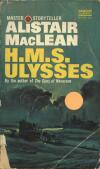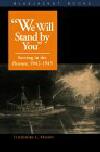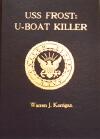H.M.S. Ulysses
MacLean, Alistair
1959, William Collins, London
ISBN 0385041837
| Type. | Novel |
| Rating. |  |
 This is an excellent, but extremely dark, book. Based on the author's wartime experiences, and written by him in a cathartic few weeks, it combines a PQ-17-like situation with an exhausted crew whose poor morale has recently led to a mutiny.
This is an excellent, but extremely dark, book. Based on the author's wartime experiences, and written by him in a cathartic few weeks, it combines a PQ-17-like situation with an exhausted crew whose poor morale has recently led to a mutiny.
Like PQ-17, in this book an Arctic convoy is ordered to scatter, knowing there are German battle surface ships ahead; however, PQ-17 is referred to in the narrative, so the action is evidently meant to be placed subsequent to it in time. To add to the treacherous passage, a howling gale blows up.
The book begins by recounting the facts of a mutiny which has recently erupted. As the grim details of the ship's history unfold, it is clear that the rebellion stemmed from exhaustion and hopelessness resulting from an endless succession of tortuous tours of duty escorting convoys. Now, HMS Ulysses is given the chance to redeem herself by making a dangerous journey escorting a Murmansk-bound convoy, and if necessary to act as bait for the Tirpitz. Obviously this is the final blow in terms of morale to the already angry, bitter and war-weary crew who feel their lives are being recklessly endangered by staff officers who understand nothing of Arctic conditions. Animosity among the crew members only makes the burden heavier.
This is an authentic tragedy in the classical sense. It displays unity of place, time and action; the characters are marked by fatal flaws; and a sense of inevitable doom hangs over the narrative from the outset. As the ship is separated from the convoy after the order to scatter, each man plays according to his character. Some find redemption; some find despair; some are revealed as cowards. One man, Ralston, who embodies integrity yet is motivated by revenge, is the most tragic figure in the narrative. In tragedies, revenge never pays; Ralston must make the ultimate act of courage and sacrifice in poetic recompense for the punishment he has dealt out to his enemies.
The most powerful force in the novel is not the Germans, but the weather and the sea. These elemental forces, impartially and implacably tightening their holds on friend and foe alike, are the true universal opponents.
Review written by Tonya Allen.
Published on 1 Dec 2000.
This title is highly recommended.
Return to our main review page.



